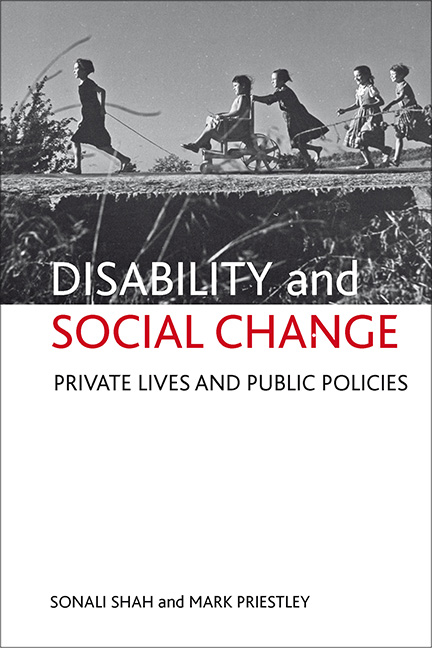one - Policy, history and biography
Published online by Cambridge University Press: 01 September 2022
Summary
This chapter sets the scene for the book's main themes, by examining the challenge of linking biography with history in terms of disability policy in 20th-century Britain. As explained in the Introduction, some of the key areas of policy that have affected people's personal lives are explored in more detail in subsequent chapters, including areas such as the provision of public health care, education and employment. The main purpose of this chapter is to provide a context for reading the individual biographical experiences related in Chapter Two.
The chapter begins by briefly outlining some of the key change dimensions in public policy since the 1940s, comparing the current state of the art with past policy developments and policy claims arising from the disabled people's movement. The second part moves to a more detailed discussion of how individual biography can be used to reveal, and raise questions about, these social changes.
Changing policies and claims
The disability studies and policy literature has provided much evidence that people with impairments are disadvantaged in important areas of social life, such as education, employment, family life, political participation, cultural representation; or in access to public goods and services, like transport, housing, access to information, and so on (for example, Topliss, 1975; Barnes, 1991; Prime Minister's Strategy Unit, 2005; Williams et al, 2008). The challenge is to explain how and why this happens but also to gauge the extent to which the situation changes over time and whether changes in public policies have real impacts on people's lives.
Alongside continuing concerns about the considerable inequalities and barriers that face disabled people in Britain there has also been mounting evidence of change in the treatment of disability as a public issue (in public attitudes towards disability; in the emergence of the disabled people's movement; in the shift from welfare-based to rights-based social policies; in technological developments; and in labour market opportunities, for example). While we do not share the unguarded optimism of some policy makers, it is our hypothesis that young disabled people in 21st-century Britain are making life choices in a different opportunity structure from their recent predecessors.
- Type
- Chapter
- Information
- Disability and Social ChangePrivate Lives and Public Policies, pp. 5 - 22Publisher: Bristol University PressPrint publication year: 2011



